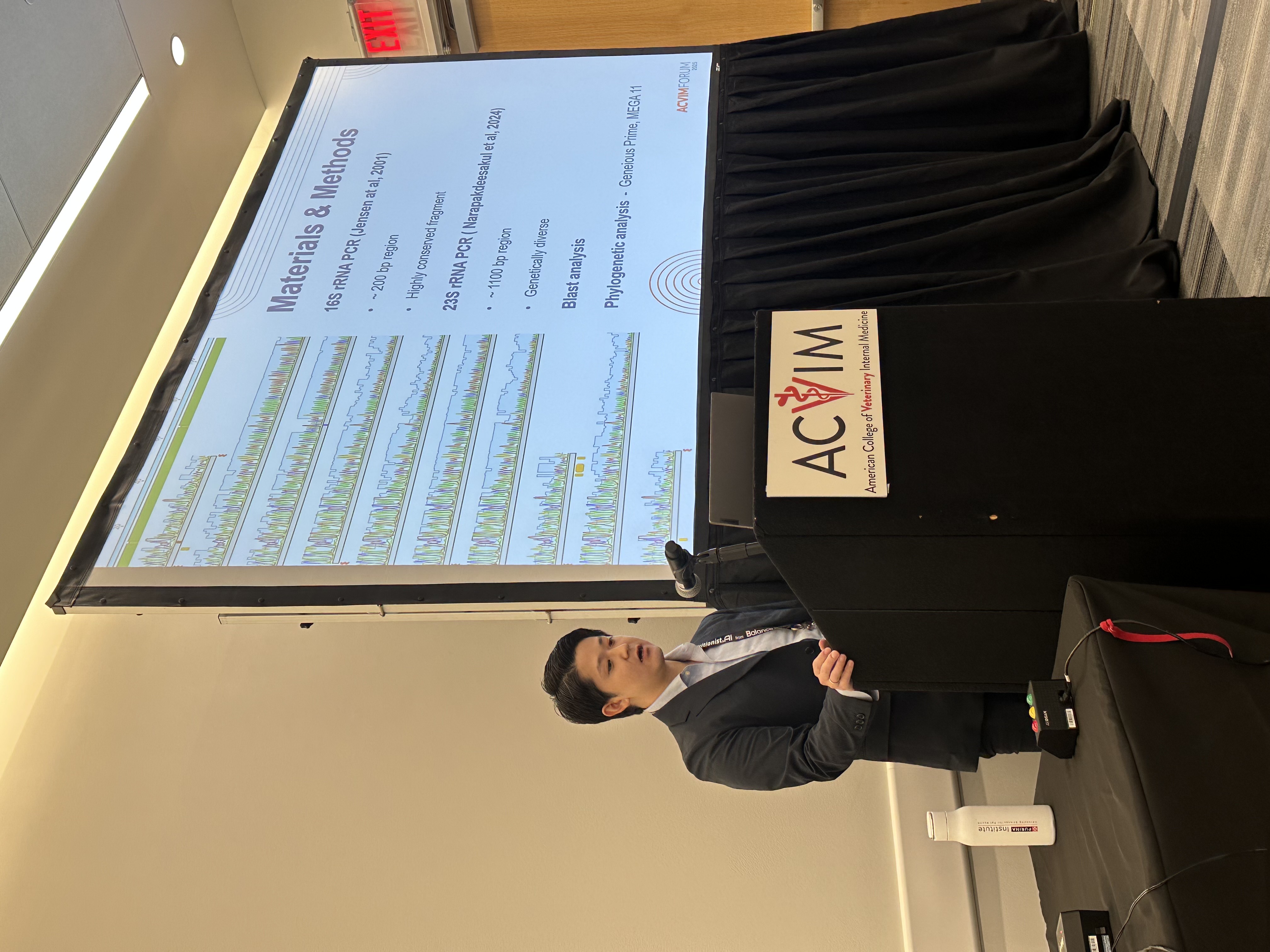ニュース
こんにちは、小西啓介です。
6月にはACVIMに参加し、初めての研究発表を行いました。コロナ禍以降、学会に参加する機会がなく、実に7年ぶりの学会参加がいきなりACVIMという状況でした。日本の学会との大きな違いは、世界中からその分野のスペシャリストが集まり、論文にもまだ出ていない最新のデータを直接知ることができる点です。専門医やレジデントにとってはもちろん、総合診療をしながら得意分野を伸ばしたい先生方にとっても非常に刺激的で学びの多い場だと実感しました。自身の研究は口頭発表で、緊張もありましたが無事終えることができ、終了後にはCSU内科の仲間や指導教官のDr. Lappinと打ち上げをしたのが良い思い出となりました。
7月からは、いよいよレジデント1年目として診療を開始しました。やはり最初は英語で苦労しました。学生に鑑別診断やプランを指導しなければならず、飼い主さんへの説明も英語で分かりやすく行う必要があります。さらに、紹介状のスタイルも日本とは異なり、要約ではなく電子カルテそのものが送られてくるため、数十ページのカルテを読み込み、自分でまとめておく必要があります。診察後には飼い主さんへの診療報告書を翌日までに作成し、カルテは原則3日以内に紹介医へ送付しなければなりません。寝不足やプレッシャーに押しつぶされそうになることもありますが、アメリカ人レジデントですら「最初は本当にきつい」と言っているので、ある意味当然なのかもしれません。
3年目のレジデントが1日に数件を軽々とこなしているのを見ると「自分も本当にああなれるのだろうか」と不安になりますが、1件1件にじっくり取り組むことで、知識が飛躍的に伸びていることを実感しています。もちろん大学病院には日本の労働基準法のような制約はなく、残業(残業代もなし)やオンコールは当たり前です。その代わり、たった3年で専門医になれるほどの知識と経験を得られるシステムが成り立っています。専門医の知識量は驚異的で、「いったい脳が何個あるのだろう?」と思うほどですが、それは時間と体力と精神を犠牲にして得られたものです。
日本では絶対に得られないハイレベルな知識と経験を学べる今は、人生で一番大変な時期ですが「ここに来て本当によかった」と心から思います。VCAJ内のセミナーや症例相談を通じて、学んだことを少しでも共有できることにやりがいを感じますし、プログラム終了後には専門医としてさらに貢献したいと思っています。
もし北米での臨床留学に興味がある方がいれば、まずは短期でもいいので一度visitingしてみてください。百聞は一見に如かずです。必ず壁にぶつかり、惨めな思いや落ち込むこともありますが、それでも専門医を目指したいという強い意思があれば挑戦する価値はあります。臨床留学に限らず、人生は一度きりです。チャレンジしたことが必ずしも成功につながらなくても、その経験とノウハウは挑戦した人にしか得られない財産となります。
ともにチャレンジを続け、自分のなりたい獣医師を目指しましょう。
Hello everyone,
In June, I had the opportunity to give my first research presentation at ACVIM. Since the onset of the pandemic, I hadn’t been able to attend any conferences, so this was actually my first in seven years—and quite a way to return. One of the most striking differences between veterinary conferences in the U.S. and those in Japan is the truly global nature of participation. Specialists from around the world gather to exchange insights and access cutting-edge data, often well before it’s published. It was an incredibly stimulating and enriching environment—not only for specialists and residents, but also for general practitioners looking to deepen their expertise while continuing in clinical practice.
My presentation was an oral session. Although I was understandably nervous, it went smoothly, and one of the most memorable moments was celebrating afterward with colleagues from CSU’s internal medicine team and my mentor, Dr. Lappin.
In July, I officially began clinical duties as a first-year resident. As expected, the language barrier proved to be one of the biggest initial challenges. I was responsible for guiding students through differential diagnoses and treatment planning, as well as communicating clearly and compassionately with pet owners—all in English. The referral process also differs significantly from Japan. Rather than receiving a concise summary letter, we are typically sent the full electronic medical record, often spanning dozens of pages. It’s my responsibility to thoroughly review and synthesize that information into a practical, case-ready summary. Following each consultation, a report for the pet owner must be submitted by the next day, and the record is expected to be sent to the referring veterinarian within three days.
There are certainly moments when the combination of sleep deprivation and constant pressure feels overwhelming. But even American residents often say, “The first year is the toughest,”—and knowing that brings a sense of perspective and humility.
Watching third-year residents manage multiple complex cases with confidence and ease, I sometimes wonder, “Will I ever get to that level?” Still, I can already feel my knowledge growing rapidly by fully engaging with each individual case. Of course, unlike Japan, there are no labor protections equivalent to the Labor Standards Act—unpaid overtime and on-call shifts are simply part of the system. That said, the structure of residency training here is designed to provide the clinical experience and depth of knowledge required to become board-certified in just three years. The expertise that specialists possess is remarkable—at times I genuinely wonder how many brains they must have. But it’s clear that such mastery is earned through years of dedication, personal sacrifice, and mental resilience.
This is undoubtedly the most demanding period of my life, but I can say with confidence that I’m grateful to be here. The level of clinical knowledge and hands-on experience I’m gaining is something I could never have achieved in Japan. Through VCA Japan seminars and case consultations, I’ve found great meaning in sharing what I’ve learned, and after completing this program, I hope to contribute even more as an internist.
For anyone considering a clinical residency in North America, I strongly encourage you to visit—even for a short period. There’s no substitute for firsthand experience. You will encounter challenges, setbacks, and moments of self-doubt. But if you are truly committed to becoming a specialist, the journey is absolutely worth pursuing. And this extends beyond residency—life is short, and every challenge carries the potential for growth. Even if a challenge doesn’t lead directly to success, the experience and insight you gain are lasting assets that only those who step forward can earn.
Let’s continue to challenge ourselves, and strive toward becoming the veterinarians we each aspire to be…!
Keisuke Konishi
